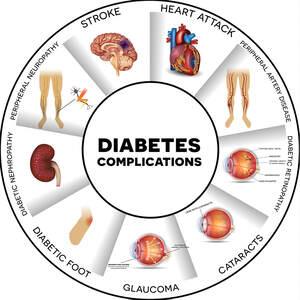As the condition progresses, some of the retinal blood vessels become blocked. As the vessels become blocked, new abnormal vessels may form, but the new vessels do not supply the retina with nutrients and oxygen the same as normal vessels. Instead, they may leak fluid, which leads to swelling of the macula and interferes with vision. When diabetic retinopathy becomes severe, the abnormal vessels may cause bleeding into the center of the eyes. If the condition is not treated, it can lead to a decrease in eyesight. Who gets diabetic retinopathy?Anyone that has either type 1 or type 2 diabetes can develop diabetic retinopathy, but certain people may have an increased risk. For example, the longer you have diabetes, the higher your risk of developing diabetic retinopathy. If you have hypertension, it also increases your risk. But the biggest risk factor is uncontrolled blood sugar levels. If your diabetes is not well managed, and blood sugar levels keep spiking, it may eventually affect the retina. How does diabetic retinopathy develop?Diabetes can cause blood sugar levels in your body to increase too high. Over time, if blood sugar is too high, it can lead to damage to the organs, including the retina. The increased sugar levels can cause blockage to the small blood vessels in the retina leading to damage. That damage to the retina causes new blood vessels to develop that do not work properly. Symptoms of diabetic retinopathy typically become worse over time. In the early stages, symptoms may be mild and come and go. Typical symptoms include trouble reading or seeing objects that are far away. Many people attribute these changes to aging and do not seek treatment. As the disease progresses, symptoms may get worse. Symptoms may include the following:
TreatmentTreatment for diabetic retinopathy depends on the stage of disease present. In the early stages, treatment may include careful monitoring to make sure changes to the eye have not started. Additional treatment options include the following: Injections: Medications, such as anti-VEGF drugs may slow the progression of diabetic retinopathy. The medications help decrease the growth of new blood vessels. Laser treatment: Laser procedures may help reduce swelling in the retina and stop the blood vessels from leaking. Surgery: Surgery may be recommended if the retina is bleeding or scar tissue has developed. PreventionThe best way to prevent diabetic retinopathy is to manage diabetes. If you have diabetes, it is essential to keep blood sugar levels steady and prevent big spikes. Careful monitoring of blood sugar levels is needed.
Work with your doctor to develop a treatment plan. For example, follow your doctor’s recommendations for taking your insulin or other medication. Healthy lifestyle choices, such as exercise and eating well, can make a big difference in managing diabetes. It is also critical to have regular eye exams to monitor changes in your vision. Treating diabetic retinopathy as soon as possible may help prevent vision loss. If you have any questions about keeping your eyes healthy with diabetes or if you would like to ask whether an appointment with one of our eye doctors would be appropriate at this time, call our office at 508-746-8600. Comments are closed.
|
EYE HEALTH BLOGCategories
All
Archives
July 2024
|
|
Kadrmas Eye Care New England
55 Commerce Way, Plymouth, MA 02360
14 Tobey Road, Wareham, MA 02571 133 Falmouth Road (Rt 28), Mashpee, MA 02649 |
Phone Number:
1-508-746-8600 Hours: Monday through Friday — 8 AM – 4:30 PM |


 RSS Feed
RSS Feed
